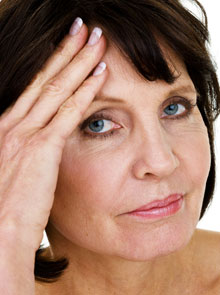When the first menopause symptoms strike, it’s easy to miss them.

Gynaecologist and author Dr Heather Currie explains what to look for and how to cope…
The actual menopause is defined as your last period and happens at an average age of 52. However, from the early to mid 40s, changing and fluctuating hormones cause subtle physical changes.
For some, the symptoms are so mild they go unrecognised, but for others, they gradually worsen until realisation hits home and they do seek help and treatment.
Common menopause symptoms
Some form of symptoms will affect 70-80% of us. On the whole, they’re due to the fall in oestrogen but many factors such as diet, exercise and lifestyle, medications and attitudes can influence the severity, incidence and impact of symptoms.
Is this happening to you?
Hot flushes
For many women, hot flushes don’t cause much distress, but 1 in 5 women suffer so badly that they could interfere with work, sleep and quality of life. Falling oestrogen levels are to blame for the changes in body temperature which can cause excessive sweating.
Headaches
A feeling of pressure and pain in the head area is fairly common, along with dizziness and heart palpitations.

Pictures: iStock.
Sleeplessness
This may be partly due to the night sweats. But insomnia has also been shown to be a menopausal symptom regardless of body temperature changes and may even begin a few years before menopause.
Joint aches
Menopause may affect the neck, wrists and shoulders but since other causes such as osteoarthritis are also common at this age, they may not be instantly recognised as menopausal symptoms.
Weight gain
This is often another by-product of menopause as the rate at which you burn kilojoules (your metabolism) slows down dramatically round this time.
ALSO SEE: Menopause diet tips for ditching extra kilos
Breast tenderness
A rollercoaster of hormonal changes means oestrogen levels can fall and peak causing breast tenderness as well as a dip.
Period problems
Most people experience changes with heaviness, irregular, less frequent or more frequent periods. This changing pattern can fluctuate over years.
Heavy bleeding
This is one possible result of hormonal upheaval and can be alarming as well as inconvenient. Symptoms need to be investigated to rule out other causes, but there are a variety of effective treatments available.
Psychological symptoms
Mood swings, irritability, anxiety, forgetfulness and foggy brain are common. Mood changes can be distressing- so it’s worth chatting to your doctor about effective treatments to help.
ALSO SEE: 4 natural therapists who can help you thrive through menopause symptoms
How long will the menopause symptoms last?
The average time the symptoms of oestrogen deficiency last is about two years but some women have none at all and others continue having symptoms for years.
What alternative therapies help?
Red clover, black cohosh, the pollen extract femal and even acupuncture has been found to be useful. Evening primrose oil and starflower oil may help to reduce breast tenderness. But from a medical point of view, there’s a lack of information on effectiveness, mechanism of action and safety.
